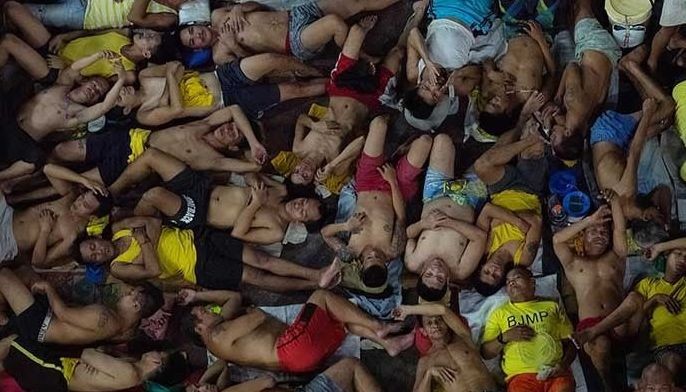MANILA, Philippines — Detention facilities in Southeast Asia should suspend arrests for non-violent offenses and release vulnerable people and those who pose little threat to public safety early to avoid the spread of the contagion in the region’s overcrowded jails.
The International Drug Policy Consortium (IDPC) laid down these recommendations as the confirmed cases of new coronavirus worldwide continue to pile up.
Related Stories
Because the new virus is transmitted easily through droplets, authorities say the best protection is staying home. But isolation is an unreachable luxury for hundreds of thousands crammed into small and overcrowded facilities in the Philippines, making them more vulnerable to the spread of COVID-19.
IDPC said the Philippines had the highest prison occupancy rate in the world in 2019, with overcrowding in jails reaching 534% in March 2020.
“Such cramped conditions and the fact that essential activities such as eating, showering and using the toilet are often communal, make it impossible to comply with advice on COVID-19 prevention, namely physical distancing,” the non-government organization said.
It added that people deprived of liberty are also more likely to have underlying health conditions and at higher risk of prevalence of HIV, viral hepatitis and tuberculosis, which increase their vulnerability to COVID-19 infection.
IDPC said authorities in Southeast Asia should suspend or reduce arrests and admission into detention facilities, including drug rehabilitation centers, for non-violent offenses, which include drug use and possession and violation of curfew and lockdown orders.
The organization also said that the elderly, pregnant women, children, people with health conditions, people awaiting trial and not convicted and those charged with minor offense must be granted early release. Iran, Afghanistan and Indonesia released thousands of prisoners to lower the risk of a major outbreak of the virus in prisons.
IPDC added that prison authorities should also improve standards of sanitation and hygiene, ensure supply of personal protective equipment, ensure availability of COVID—19 testing, isolation facilities for quarantine and access to medical treatment and enable people deprived of liberty to maintain outside communication by allowing phone or online calls.
15 inmates isolated
Fifteen inmates in Quezon City Jail were isolated after they came in contact with an inmate who died of suspected COVID-19 infection last week. The Quezon City Jail houses around 3,800 inmates.
But Bureau of Jail Management and Penology spokesman Xavier Solda said the jail immediately conducted contact tracing and isolated the detainees held in the same jail cell with the deceased inmate.
Last month, the Bureau of Corrections suspended visitation privileges in all its prison facilities across the country. As of January 2020, there were 49,114 inmates in BuCor-manned prisons.
BJMP also suspended jail visits a day later. Around 134,549 persons deprived of liberty are detained in 476 jails nationwide as of September 2019.
The new coronavirus has so far infected 3,246 people in the Philippines—152 of whom have died. — Gaea Katreena Cabico


